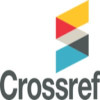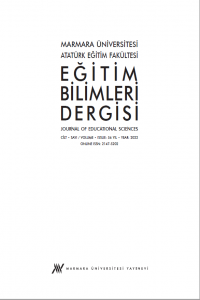Research Article
Aim & Scope
The journal aims to present to the scientific community the studies that fulfill the high level of originality and scientific criteria, which will provide a solution to the issues regarding global scale of education.
Journal of Educational Sciences offers scientific studies on educational sciences and education in different fields.
Studies should be prepared in accordance with the guide lines on our website. The studies submitted to our journal are firstly handled carefully by the editor in terms of purpose, subject matter, content, presentation style and compliance with the writing rules. In the second stage, the studies submitted to our journal are evaluated by the field editor.
Reasons for Rejection
Descriptive studies;
The journal is subject to the principle decisions taken during the new publication period including review studies dominated by the descriptive direction are not accepted for publication.
Studies for group differences;
Due to the principle decisions that our journal received during the new publication period, studies based only on the groups differences statistics are not considered for publication.
Qualitative studies;
Lack of the design of the qualitative study and its reasoning, sampling technique of study group, the validity and reliability of the research process that is not adequately provided and the data that are not sufficiently analyzed in depth is shown as the reason for rejection.
Updated data;
The period of collection of the data used in the study exceeded five years and the loss of the update is accepted as the reason why the study was not published.
Experimental studies;
The fact that experimental data are not supported qualitatively counts as a reason for not being under review process.
Author Guidelines
JOURNAL OF EDUCATIONAL SCIENCES
ARTICLE SUBMISSION GUIDE
Journal of Educational Sciences is a peer-reviewed journal that accepts reviews, translated and original works that utilize qualitative, quantitative or mixed research methods which pertain to all sub-headings of the field of educational sciences. The publication of a manuscript in the journal is dependent upon the completion of the following requirements:
- It is understood that submitted manuscripts have not been published previously and are not being submitted for publication elsewhere.
- The manuscripts should be original and should include contributions from all of the authors indicated.
- The manuscripts are expected to comply with the ethical principles
- For the conference papers that have been previously presented, as long as the manuscript is not wholly published in a conference booklet (the abstract may be published in the booklet), the following statement must be included in the footnote at the end of the page: The first version of the manuscript is presented at.....’
General Guidelines
- The publication languages are English and Turkish.
- The manuscript should follow the writing guide of APA 6 and if in written Turkish, the writing rules of Turkish Language Association.
- The Manuscripts should not exceed 6000 words including tables, figures and works cited.
- The manuscript must include abstracts written in Turkish and in English, key words (4-5 words at the end of abstract), introduction, methodology, findings and, references.
- Main manuscript document should not include author information.
- The author information document must be submitted seperately and must include first names and surnames of the authors, relevant phone numbers, affiliated institution, academic titles (if applicable) and email address. The lead author must be specified in the manuscript. All co-authors must agree that the lead author assumes sole responsibility for the manuscript on behalf of all of the co-authors as the lead author reserves the right to decide on matters regarding the manuscript.
- The lenght of abstracts must be between 150 to 200 words and must include the statement of the research problem, aims of the study, methodology, main findings and conclusion.
- The introduction page of the manuscript must clearly state the aims and problem of the study.
- The methodology section start with statement of the research model. The subheadings must include sample, data collection instruments and data analysis.
- The statements in the manuscript must be clear. Furthermore, the manuscripts written in Turkish must include Turkish equivalents of given concepts.
- Translated Turkish words that will be used for the first time in the field of education should be accompanied by the given words in the original language.
Tables, Figures and Appendix
- The figures must be placed within the text. Separate les to illustrate figures are not needed.
- Figures presented in the manuscript must be sufficiently clear.
- The headings of the tables and figures must follow the guidelines that are presented under ‘general formatting guidelines’
- Appendix must be presented on a separate page after the references section.
Manuscript Submission
Manuscripts should be submitted electronically via the following web site: (https://dergipark.org.tr/maruaebd)
Ethical Principles and Publication Policy
Marmara University Atatürk Faculty of Education Journal of Educational Sciences is committed to maintaining the highest standards of publication ethics and to meeting and upholding the following principles of Core Practices prepared in accordance with the guidelines and policies developed by the Committee on Publication Ethics (COPE) for journal editors.
Submitted manuscripts should not have been previously published, or scheduled and/or evaluated to be published in another journal.
Marmara University Atatürk Faculty of Education Journal of Educational Sciences adheres to the standards of COPE for publication ethics. Therefore, in cases of misconduct or violation of publication ethics, the journal will take the publication ethics flowcharts developed by COPE (https://publicationethics.org/resources/flowcharts) as a reference.
In accordance with the double-blind peer review process, Marmara University Atatürk Faculty of Education Journal of Educational Sciences preserves the anonymity of authors and reviewers when submitted articles are sent for review.
It is the journal’s responsibility to maintain the confidentiality of any information regarding authors. However, such information may be shared in a possible enquiry in order to investigate any allegations of misconduct. Marmara University Atatürk Faculty of Education Journal of Educational Sciences defines its principles regarding any allegations of misconduct in accordance with the guidelines prepared by the COPE and shares these principles with the stakeholders on its website.
Text recycling, that is using the chapters of a single text in various publications of the same author without any reference, is unacceptable for Marmara University Atatürk Faculty of Education Journal of Educational Sciences. In such cases, the journal acts according to the relevant guidelines determined by the COPE.
Marmara University Atatürk Faculty of Education Journal of Educational Sciences protects and supports freedom of expression under all circumstances. Moreover, the journal considers any racist, sexist or discriminatory content as hate speech and uses its right to refuse such contents without sending them for review.
In case of a conflict of interest regarding an article, the journal openly supports intellectual and ethical standards; and defines relevant ethical principles that authors, reviewers, editors and theme editors should adhere to.
In case of a conflict of interest regarding an article, the journal suspends the peer review process until the ambiguity is clarified; and it has the authority to request the Ethics Board Waiver Form, Interview Consent Form and other documents that need to be submitted from authors regarding their articles.
Marmara University Atatürk Faculty of Education Journal of Educational Sciences is sensitive and responsible for publishing edited contents, commentaries, apologies and refutations.
Editors and publishers of the journal are obliged to follow legal advices in case that repetitions in an article, that is coinciding texts in two different publications, violate any intellectual property rights.
Copyright Regulation and the Conflict of Interest Principle
Marmara University Atatürk Faculty of Education Journal of Educational Sciences is an open access journal which means that all content is freely available without charge to the user or his/her institution. Except for commercial purposes, users are allowed to read, download, copy, print, search, or link to the full texts of the articles in this journal without asking prior permission from the publisher or the author.
The articles in Marmara University Atatürk Faculty of Education Journal of Educational Sciences are open access articles licensed under the terms of the Creative Commons Attribution-NonCommercial 4.0 International (CC BY-NC 4.0) license (https://creativecommons.org/licenses/by-nc/4.0/deed.en)
Principles for Handling Allegations of Misconduct
Marmara University Atatürk Faculty of Education Journal of Educational Sciences adopts COPE’s guidelines regarding “allegations of misconduct” in cases of misconduct and violation. Hence, the journal defines in detail the liabilities of the publisher, editors, reviewers, the Scientific Board and authors prior, during and after the publication process in the Publication Ethics.
In cases when an article is submitted to various publishers, comparing different versions of a single work submitted to various journals and explanations of authors and enquirers regarding the work in question enables to cooperate and make an effort in cases of suspected misconduct and violation and to act accordingly together with enquirers/authors and/or their institutions.
Having regard to the significance of confidentiality in scientific publication process, Marmara University Atatürk Faculty of Education Journal of Educational Sciences shares information regarding authors and reviewers only in order to prevent suspected misconducts and to fulfill the obligation to handle such cases.
Journal editors and theme editors have to make the first enquiries in suspected cases before sharing such information. Thus, sharing information is only at stake when the author does not respond, provides insufficient explanation or the said allegation of misconduct might affect more than one journal.
If required, such information is only shared with editors whom are believed to have knowledge of the subject in question, and the shared information is limited with factual content only.
Editors and theme editors guarantee to protect confidentiality of communication to the greatest extent possible.
Publisher
Marmara University Atatürk Faculty of Education Journal of Educational Sciences’s publisher is the Dean of the Marmara University Faculty of Education.
The publisher guarantees that the stakeholders maintain the publication ethics principles, that access to the journal’s contents is uninterrupted and free of charge, and that the publications are archived and protected.
The publisher is obliged to take the necessary actions to clarify any suspected violations of publication ethics such as misconduct, plagiarism, conflict of interest and text recycling.
Scientific Board
The Scientific Board of Marmara University Atatürk Faculty of Education Journal of Educational Sciences meets at least biannually.
Members of the Scientific Board accept the publication ethics principles and policies, and evaluate decisions regarding these principles and policies.
They determine themes and relevant editors for each theme.
They recommend members for the Scientific Board.
They make proposals in order to improve the national and international recognition of the journal.
Members of the Scientific Board have to inform editors of the journal to clarify any suspected violations of publication ethics such as misconduct, plagiarism, conflict of interest, copyright infringement and text recycling.
They make recommendations of citation indexes in which the journal might be included in order to improve its academic quality.
Editors
Submitted articles are evaluated regardless of authors’ race, ethnicity, gender, worldview and beliefs by the editors.
Editors make comprehensive and constructive evaluations of submitted articles.
The journal includes writings that do not require a peer review process such as essays and activity reviews. The difference between reviewed publications and the publications that do not require a peer review process is distinctly made clear. If required, editors might make comments and suggestions as to under which category submitted articles should be published, and share them clearly with authors. In such cases, authors and/or editors make the final decision.
Editors are responsible for making contact between authors and reviewers during the peer review process. They conduct the process by documenting the whole process meticulously from the date of submission to the date of publication with academic courtesy. If need be, editors feel free to give account of the whole peer review process for each article (provided that they look after the personal rights of authors and reviewers and the journal’s principles of confidentiality).
In case that two reviewers present different opinions on an article, editors have to seek the opinion of a third reviewer.
Editors should withdraw themselves from their editorial task if they are in conflicts of interest or in relationships that could lead to a conflict of interest regarding articles.
Other editors who will continue as editorial staff shall report on the current status of the financial interests or other disputes (which may affect the editorial process) and withdraw themselves from the editorial staff in case of any conflict of interest. The editorial staff should not use any of the information obtained from the reviewed article for personal interest.
If editors find errors in a published article, and if this error invalidates the work or its important sections, it’s non-ethical, it contains plagiarism, they withdraw it. In this case the editors are responsible for providing a statement which clearly indicates the withdrawal of the article and an explanation of the reason for the withdrawal, besides, by providing a link which connects two versions, grant access to all readers in online platforms.
Authors
Authors have academic, ethical and social responsibilities.
Authors cannot submit more than one article for the same issue of the journal.
Article submission dates are indicated in the call for papers for the upcoming issue. Submissions made after the deadline will not be evaluated.
Responsibility for ethical violations such as plagiarism, improper citation, missing a citation, not mentioning the names of grants and supporting institutions rests with the author. In such cases, articles are refused.
Authors should state the resources of the work/research support they get in their articles.
Authors are responsible for revealing any financial and personal relationships which may cause bias regarding their work when they submit a work in any kind or format. In this context, authors have to sign the Copyright Transfer and the Conflict of Interest Forms and upload them on the system during the submission process.
Authors are responsible for the fact that the ideas and expressions of the manuscript they submit for publication have not been used in their previously published works. If these ideas and expressions have already been used, they should be indicated by references in necessary places. Otherwise, the authors are obligated to correct overlapping parts upon the editors’ request or to do their part for publication of a correction if the article has been published.
Authors undertake that, submitted manuscripts to Marmara University Atatürk Faculty of Education Journal of Educational Sciences have not been previously published, or scheduled and/or evaluated to be published in another journal.
Authors should be able to render an account of validity and ethics for each part of the work.
If there are multiple authors who contribute to the work, the name order of these authors which has been sent during submission process should be co-decision of the authors.
The responsibilities to include only those who have active contributions in the work as authors, not to include non-active contributors among the authors, to sequence the authors, and to provide appropriate justification for any changes in the author sequence while evaluation process is in progress, rest with the author. The author should be able to provide explanation regarding all these matters if it is deemed necessary by the journal editors.
If the authors find errors and mistakes after publication of their work, they should immediately notify the editors of the journal so that appropriate action can be taken.
Authors cannot publish the same article or part of it in multiple journals without providing an appropriate reason, without permission or cross-reference. Authors are obligated to comply with the license and copyright transfer agreement they have signed.
Reviewers
They adopt double-blind peer review process and fulfill the requirements of it.
When a peer review has been requested, they should respond positively or negatively within a reasonable time period.
They should reveal if they do not have expertise on the subject regarding the work, or if they are able to evaluate only a part of the work.
They should accept carrying out the evaluation within a mutually agreed time period and they should inform in case of delay.
Reviewers should reveal to the editors any conflict of interest which may cause bias in their reviews regarding article, and they should refrain from reviewing the article in such cases.
Reviewers are responsible for informing the editors when they identify text recycling in a submitted article.
Reviewers should not use any information within the article which is about their field of interest, before the reviewed article is published.
If they think that they cannot make a fair and unbiased assessment, they should report it.
They should refuse to review manuscript if it is very similar to their work which they have been preparing or in the evaluation process.
During Review;
They should inform the journal if they notice a conflict of interest arise, which was non-existent when they accepted peer reviewing.
They should keep all the writings and peer reviews confidential.
They should ensure that their evaluations are only scientific; they will not be affected positively or negatively due to personal, financial or intellectual bias.
They should not make personal comments or unjustified accusations against the author.
They should be specific in their critics; for example they should concretize a general statement such as “a previous study”, this will help the editors to act fairly to the authors in the evaluation and decision-making process.
They should remember it is author’s work and if the manuscript is written clearly, they should not attempt to rewrite it in the way they choose; but recommendations of clarification of expressions are important.
They shouldn’t contact authors directly, without informing the journal.
They should recognize the sensitivities that may arise out of writing in another language and express it in a respectful and appropriate manner.
They should not recommend to reference works just to be visible or increase the number of referrals of themselves or their colleagues. If a recommendation is made, it should be justified scientifically.
After Review;
They should maintain keeping the work and the evaluation process confidential.
In case a situation arises which may affect their comments and feedbacks, they should notify the journal.
They should try to respond to requests from the journal for revision and reassessment.
Policy of Screening for Plagiarism
Ethical violations such as plagiarism are unacceptable by Marmara University Atatürk Faculty of Education Journal of Educational Sciences and it is primarily author(s)’s responsibility to ensure that submitted articles do not contain such violations.
All submitted articles are examined via Turnitin, and a similarity report is received prior to the peer review process.
If the similarity rate is 20% or more, editors share the results of the report with the author and reject the article without sending them for review.
Indexes
Citation Indexes
Other Indexes
Journal Boards
Editor in Chief

Editors


Editorial Assistants

Field Editors

Editorial Board
1970 Rize-İkizdere doğumludur. İlk ve orta öğretimini İstanbul Üsküdar’da tamamladıktan sonra,1987 yılında girdiği Boğaziçi Üniversitesi Fen Edebiyat Fakültesi Psikoloji Bölümünden 1992 yılında mezun olmuştur. 1992-1996 yılları arasında çeşitli orta öğretim kurumlarında öğretmenlik ve psikolojik danışmanlık yaptıktan sonra 1996 yılında Marmara Üniversitesi Atatürk Eğitim Fakültesi Eğitim Bilimleri Bölümüne araştırma görevlisi olarak girmiştir. 1998 yılında yüksek lisansı, 2001 yılında ise doktorasını tamamlamıştır. 2005 yılı sonunda ise Eğitim Psikolojisi alanında doçent unvanı kazanmıştır. Marmara Üniversitesi Atatürk Eğitim Fakültesi Eğitim Bilimleri Bölümü Rehberlik ve Psikolojik Danışmanlık Anabilim Dalında 2006-2011 yılları arasında doçent olarak çalışmıştır. 2011 yılından itibaren profesör unvanı elde eden yazar, hâlihazırda aynı üniversitede öğretim üyesi olarak akademik yaşamına devam etmektedir. Özel çalışma alanı ise psikolojik perspektiften ahlâk/moral gelişimi, araştırma yöntemleri ve eğitimi ile manevi yönelimli psikoterapi ve psikolojik danışmanlıktır.














